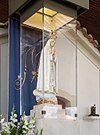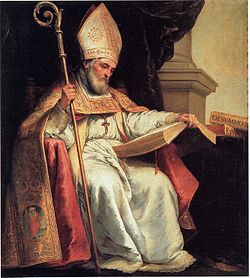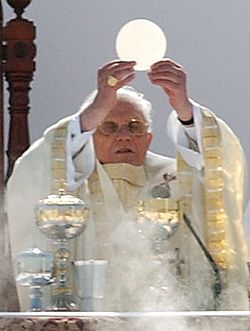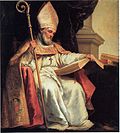Introduction The Catholic Church (Latin: Ecclesia Catholica), also known as the Roman Catholic Church, is the largest Christian church, with 1.28 to 1.41 billion baptized Catholics worldwide as of 2024. It is among the world's oldest and largest international institutions and has played a prominent role in the history and development of Western civilization. The church consists of 24 sui iuris (autonomous) churches, including the Latin Church and 23 Eastern Catholic Churches, which comprise almost 3,500 dioceses and eparchies around the world, each overseen by one or more bishops. The pope, who is the bishop of Rome, is the chief pastor of the church. The core beliefs of Catholicism are found in the Nicene Creed. The Catholic Church teaches that it is the one, holy, catholic and apostolic church founded by Jesus Christ in his Great Commission, that its bishops are the successors of Christ's apostles, and that the pope is the successor to Saint Peter, upon whom primacy was conferred by Jesus Christ. It maintains that it practises the original Christian faith taught by the apostles, preserving the faith infallibly through scripture and sacred tradition as authentically interpreted through the magisterium of the church. The Roman Rite and others of the Latin Church, the Eastern Catholic liturgies, and communities and societies such as mendicant orders, enclosed monastic orders, third orders and voluntary charitable lay associations reflect a variety of theological and spiritual emphases in the church. Of its seven sacraments, the Eucharist is the principal one, celebrated liturgically in the Mass. The church teaches that through consecration by a priest, the sacrificial bread and wine become the body and blood of Christ. The Virgin Mary is venerated as the Perpetual Virgin, Mother of God, and Queen of Heaven; she is honoured in dogmas and devotions. Catholic social teaching emphasizes voluntary support for the sick, the poor, and the afflicted through the corporal and spiritual works of mercy. The Catholic Church operates tens of thousands of Catholic schools, universities and colleges, hospitals, and orphanages around the world, and is the largest non-government provider of education and health care in the world. Among its other social services are numerous charitable and humanitarian organizations. (Full article...) Selected article
 Our Lady of Fatima (Portuguese pronunciation: [ˈfatimɐ]) is the title given to the Blessed Virgin Mary by those who believe that she appeared to three shepherd children at Fátima, Portugal on the 13th day of six consecutive months in 1917, starting on 13 May, the Fatima holiday. The title of Our Lady of the Rosary is also used in reference to the same apparition; the children related that the apparition specifically identified herself as "the Lady of the Rosary." It is also common to see a combination of these titles, i.e., Our Lady of the Rosary of Fatima (Portuguese: Nossa Senhora do Rosário de Fátima).Between May and October of 1917, three shepherd children, Lúcia Santos and her cousins Jacinta and Francisco Marto, reported visions of a luminous lady, believed to be the Virgin Mary, in the Cova da Iria fields outside the hamlet of Aljustrel, near Fatima, Portugal. The Lady appeared to the children on the 13th day of each month at approximately noon, for six straight months. The only exception was August, when the children were kidnapped by the local administrator.
Selected image
 Oil-on-panel portrait of Sir Thomas More by Hans Holbein the Younger (1527)
Thomas More was a lawyer and political figure in 16th century England, best remembered as Henry VIII's Lord Chancellor. Selected biography
 John Chrysostom (349– ca. 407, Greek: Ιωάννης ο Χρυσόστομος, Latin: Ioannes Chrysostomos) was the archbishop of Constantinople. He is known for his eloquence in preaching and public speaking, his denunciation of abuse of authority by both ecclesiastical and political leaders, the Liturgy of St. John Chrysostom, and his ascetic sensibilities. After his death (or, according to some sources, during his life) he was given the Greek surname chrysostomos, meaning "golden mouthed", rendered in English as Chrysostom.The Orthodox Church and Eastern Catholic Churches honor him as a saint (feast days: November 13 and January 27) and count him among the Three Holy Hierarchs (feast day, January 30), together with Saints Basil the Great and Gregory the Theologian. He is recognized by the Roman Catholic Church as a saint and a Doctor of the Church.
Did you know...
Related portalsFeast Day of April 4
Selected quote
News
SubcategoriesTopics
The Holy Bible:
Particular Churches (grouped by liturgical rite):
Things you can do
External resourcesWikiProjectsAssociated WikimediaThe following Wikimedia Foundation sister projects provide more on this subject:
Discover Wikipedia using portals |
Värsked postitused
Most Used Categories
- Arhiiv (8,249)
- Muu (2,875)
- Uudiseid (1,163)
- Huumor (758)
- Kultuur (420)
- Meeldib.ee (196)
- Tervis (112)
- Anekdoodid (42)











































You must be logged in to post a comment.